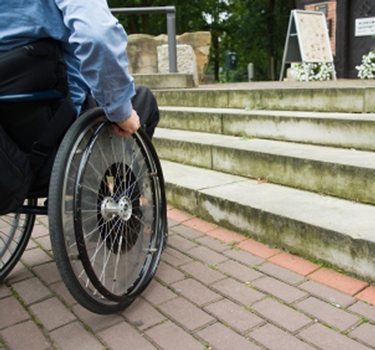
In general, public accommodations discrimination happens when someone is denied access to the facilities or services of a business or other public place, including local and state government. It may happen when services are denied outright, such as when someone is refused admission. It may also happen when someone is denied the same service others receive; for example, if they are charged a different price or offered less service.
It also occurs when a physical barrier or other obstruction makes services inaccessible to someone who has a physical disability.
What is a public accommodation?
Generally speaking, public accommodations include most (but not all) business or buildings that are open to or offer services to the general public. Under the Ordinance, a public accommodation means and includes every business, professional or commercial enterprise, hospital or nursing home, refreshment, entertainment, sports, recreation or transportation facility located in the County, whether licensed or not, non-government entities, whose goods, services, facilities, privileges, advantages or accommodations are extended, offered, sold or otherwise made available in any manner to the public. Federal anti-discrimination laws also prohibit discrimination against certain protected groups by government-owned facilities or in the provision of government operated services, programs, or activities. Public accommodation does not include a bona fide private club or other establishments not in fact open to the public.
Who is protected?
For the denial of services to be illegal discrimination, it must be based on someone’s race; color; religion; national origin; sex; pregnancy; childbirth or related medical conditions; age; marital status; sexual orientation; gender identity; military status; disability; the use, handling or training of a guide or support animal for disability; or relationship to a person with a disability.
It is important to know that it is also illegal to discriminate against someone because they have opposed illegal discrimination, filed a complaint, or assisted in an investigation. This is called retaliation, and the law protects those who oppose illegal behavior.
Examples of Discrimination in Public Accommodations
Here are just a few situations that may be illegal discrimination in public accommodations:
- a restaurant owner refuses to serve a customer wearing religious headgear
- a delivery service will not deliver to a largely minority neighborhood, but serves surrounding non-minority neighborhoods
- a taxi driver refuses to allow a minority person in her cab
- a retail establishment will not provide handicapped-accessible parking to patrons with disabilities
- a grocery store does not provide a wheelchair accessible entrance
- a "private membership" club solicits members from the general public, but denies admission based on race or religion
- a public library bars service animals from entering the facility
- a county recreation center denies a person with arthritis the right to swim during pool hours for the general public
- a person who has an intellectual or cognitive disability is denied assistance in completing an application for public benefits

